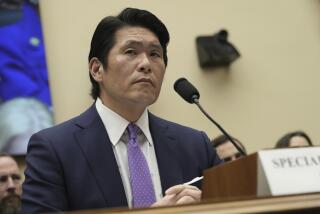Bush Vows Innocence in Iran-Contra Scandal : Promises to Cooperate With Congress but Still Refuses to Discuss Role in Deal With Honduras
- Share via
WASHINGTON — President Bush declared Thursday that “my conscience is clear” in the Iran-Contra scandal and promised that his Administration would give Congress full cooperation on requests for information that lawmakers suspect was withheld.
But he continued to refuse to say whether he had served as a messenger in a 1985 Ronald Reagan Administration deal to obtain Honduran support for the Nicaraguan rebels in exchange for increased U.S. assistance for that country.
Questions about Bush’s role resurfaced two weeks ago when documents released at the Oliver L. North trial suggested that then-Vice President Bush carried such a promise of support to Honduras in 1985 in exchange for Honduran aid for the anti-Sandinista rebels. At the time of the trip, U.S. assistance to the rebels was banned by Congress.
Bush Asked About Documents
Sen. Daniel K. Inouye (D-Hawaii) and Rep. Lee Hamilton (D-Ind.), chairmen of the congressional committees that investigated the Iran-Contra affair, and Senate Majority Leader George J. Mitchell (D-Me.) have sent letters to Bush asking that he determine whether any White House documents shedding light on the issue were not made available to the panels. They said that they had not seen the Honduran trip documents during the committee’s 1987 inquiry.
The Bush White House has maintained that all such documents from the Reagan White House are now controled by the National Archives. Thus, it is unclear what assistance the current White House could provide.
Bush himself has said--as he did Thursday--that he will not discuss his role in the matter until the North trial is over. The jury was given the case Thursday.
“I might have something to say on it when the trial is over,” Bush said, citing “a request of the lawyers” that he say nothing until then. But he added: “Put it this way--my conscience is clear.”
As for the congressional leaders’ letters, he said: “. . .I will take this opportunity to tell them we’ll cooperate fully.”
Speaking in an interview with a small group of reporters, Bush also said that a decision would be made “very soon” on setting the scope of the nation’s Strategic Defense Initiative and on how the nation’s force of MX missiles should be based.
A senior White House official suggested that Bush may be ready to take a step back from the full-speed-ahead approach to the “Star Wars” missile defense program that was pursued by former President Reagan.
During the presidential campaign, Bush was less enthusiastic about the ambitious program than Reagan has been. In addition, Brent Scowcroft, Bush’s national security adviser, has been dubious about the technological, strategic and budgetary problems it poses. Defense Secretary Dick Cheney, while giving rhetorical support to the program, has appeared less committed to its full funding.
The senior White House official, speaking on condition of anonymity, said that there is little disagreement within the Administration about the program.
But Bush is expected to press ahead with at least limited research into the potential for eventually developing a defense against ballistic missiles. The President is under pressure from Congress to decide whether to scale back to a limited, ground-based defense against accidental launch of missiles or to stay with the more expensive umbrella-like space-based program envisioned by Reagan.
The senior official also said that Bush is awaiting a formal recommendation from Cheney on the MX, the 10-warhead, long-range nuclear missiles deployed in underground silos at F. E. Warren Air Force Base in Wyoming. Critics say that such a system provides vulnerable, stationary targets in the event of a nuclear attack on the United States. At issue is whether to place the missiles and their launchers on railroad cars that could be dispersed during a period of serious international tension or whether to proceed with the development of a lighter and more mobile one- or two-warhead Midgetman missile.
The official said that Cheney had reached an informal decision in favor of the rail-based system but had not sent his formal recommendation to the White House.
The President’s interview--a 22-minute conversation with nine reporters on a porch outside the Oval Office--reflected the continuing White House effort to make the President available to answer questions in informal settings. After the session, a transcript of his comments was made available to other news media representatives.
Sitting in a wrought-iron chair by the White House South Lawn, Bush maintained that he has kept a “pretty intense” pace during the first 100 days of his White House tenure. The 100th day falls a week from Sunday.
Asked how he would assess his term at that point, he replied: “About the same as Martin Van Buren’s.” Van Buren, elected President in 1836, was the most recent sitting vice president elected to the White House.
“Martin came in; he was not radically trying to change things, but then that’s about where the parallel ends because I don’t know what he did in his first 100 days,” Bush said.
“We didn’t come in here throwing the rascals out to try to do something, correct all the ills of the world in 100 days,” he said. “Now there’s some ills of the world, there’s some unsolved problems. And I’m methodically, I think pragmatically, moving forward on these. So I really don’t measure it in terms of 100 days.”
“We’re making some progress here,” Bush said, pointing to Senate passage Wednesday of a $157-billion plan to address the savings and loan industry crisis, last week’s agreement with Congress on the outlines of a budget and the just-completed round of talks with the leaders of Egypt, Israel and Jordan.
More to Read
Sign up for Essential California
The most important California stories and recommendations in your inbox every morning.
You may occasionally receive promotional content from the Los Angeles Times.













